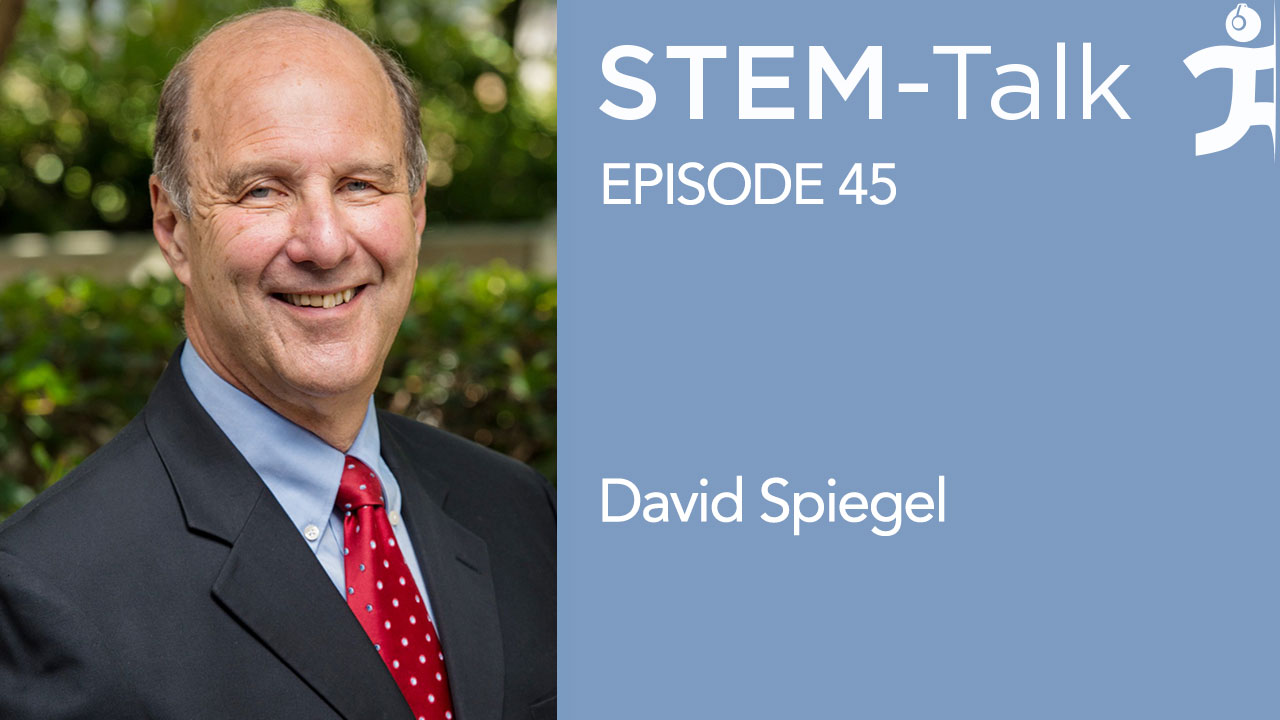STEM-Talk
Episode 45: David Spiegel talks about the science of hypnosis and the many ways it can help people
// Aug 29, 2017

Today’s interview features one of the nation’s foremost hypnotists who is also the associate chair of psychiatry and behavioral sciences at the Stanford University Medical School.
In this episode, Dr. David Spiegel talks about how hypnosis can help people not only quit smoking and lose weight, but also relieve chronic pain and reduce people’s dependency on medications.
David earned his Bachelor’s at Yale College and graduated from Harvard Medical School in 1971. His mother and father were psychiatrists and his father started practicing hypnosis just before World War II.
David now has more than 45 years of clinical and research experience studying psycho-oncology, stress and health, pain control and hypnosis. In addition to his role as the Willson Professor and associate chair of psychiatry and behavioral sciences at the Stanford, he is also the director of the Center on Stress and Health and the medical director of the Center for Integrative Medicine at the Stanford University School of Medicine.
David has published 12 books, including one with his father. He has written more than 380 scientific journal articles and 167 book chapters on topics ranging from hypnosis to psychosocial oncology to trauma to psychotherapy.
Last year David was featured in Time magazine about the therapeutic uses of hypnosis. In terms of the nation’s escalating opiate problem, David has gone on record saying that hypnosis can and should be used instead of painkillers in many cases.
“There are things we could be doing that are a lot safer, cheaper and more effective,” said David, “but we’re not because as a society we have the prejudice that hypnosis is voodoo and pharmacology is science.”
David’s research has been supported by the National Institute of Mental Health, the National Cancer Institute, the National Institute on Aging, the National Center for Complementary and Integrative Health, the John D. and Catherine T. MacArthur Foundation and the Dana Foundation for Brain Sciences.
David is the past president of the American College of Psychiatrists and the Society for Clinical and Experimental Hypnosis, and is a member of the National Academy of Medicine.
Links:
David Spiegel Stanford profile page
“Group Therapy for Cancer Patients” — http://amzn.to/2wd7c39
“Living Beyond Limits” — http://amzn.to/2vlTzzZ
Show Notes
3:42: Ken and Dawn welcome David to the show.
3:56: Dawn comments on how both of David’s parents were psychiatrists, and how his father started practicing hypnosis just before WWII. She then asks David if it was always his plan to follow in his parents’ footsteps.
4:53: Dawn discusses how David got his Bachelor of Arts in Philosophy and then decided to attend Harvard Medical School. She asks David why he decided to specialize in hypnosis.
7:26: After graduating from medical school, David made news for refusing pain medication after his operation. Ken asks David to describe what he did.
8:51: Dawn asks David to give an overview of hypnosis.
11:48: David talks about how hypnosis and mindfulness are similar and different.
13:48: Ken asks David if people who are easily hypnotized are also more likely to be able to successfully practice meditation or mindfulness.
14:44: Dawn discusses how she has colleagues that are interested in studying mindfulness for conditions such as PTSD or pain management, but they have had trouble finding funding on these topics. She then asks David who typically funds the work that he does.
15:31: Dawn comments on how David has written about how hypnosis is the oldest western conception of psychotherapies and asks him to give a short historical tour of hypnosis.
20:35: Dawn discusses how David has had more than 40 years of clinical and research experience studying hypnosis, psycho oncology, pain control, psychoneuroendocrinology, and the use of hypnosis in the treatment of PTSD. Specifically, David was involved in two studies that showed that Vietnam veterans with PTSD had higher than normal tendencies to be hypnotized. Dawn then asks David to discuss these studies and the utility of hypnosis as a treatment for stress and physical trauma.
24:09: Ken asks David if he has found hypnosis to be an effective treatment for PTSD.
24:35: Ken asks David about using hypnosis to treat phobias.
26:32: Ken asks David if hypnotherapy can be used to reveal suppressed or impaired eyewitness memories and whether the courts raise questions about it.
29:17: Ken discusses a landmark study, published in the late 1990s by Pierre Rainville, looking at hypnotized people who placed their hands in really hot water. Many have said that this study changed the whole landscape of hypnosis. Ken then asks David to discuss this study and its importance.
31:06: Ken comments on how not everyone can be hypnotized, and how David has used functional MRI scans to figure out why some people are not susceptible to hypnosis. In 2012, David shared results of a study that showed hypnosis changes the way blood flows to different areas of the brain. Ken asks David to share the importance of this finding and what it revealed to him.
34:02: Dawn discusses how David has also found research that shows that hypnotizability correlates with dopamine levels in the brain. Dawn then asks if that means that dopamine is a key driver of the ability to be hypnotized, and if so why.
35:08: Dawn asks if the effect of dopamine is linear, with those with the highest levels of dopamine being the most hypnotizable.
37:04: STEMTALK BLURB
37:27: Ken asks David to talk about Parkinson’s in the context of hypnosis.
39:09: Ken asks David if there is a practical way to gauge whether someone will be receptive to hypnosis.
40:07: Ken asks David if it is possible to change people’s susceptibility to hypnosis.
41:38: Dawn asks if someone who does not believe in hypnosis can be hypnotized.
42:21: Dawn comments on David’s work in a children’s hospital and asks him if it seems like children are more susceptible to hypnosis than adults.
43:16: Dawn asks David how effective self-hypnosis is and if there are any notable limitations.
44:41: Ken asks David if response to the placebo effect is associated with hypnotizability, and if so, if people who are easily hypnotized are more likely to benefit from any placebo effects of hypnosis.
46:12: Dawn comments that the placebo effect is unable to directly change underlying physiology, and asks if there is any evidence that hypnosis can directly alter disease states themselves.
48:00: Dawn discusses how Robert Sapolsky would say that dopamine is produced to provide motivation to achieve a goal, and that it is even greater when the result is uncertain. She then asks David how this view of dopamine ties into the ability to be hypnotized, and whether there are physiological effects that are related.
49:48: Ken asks David if there are environmental factors that might make it easier to achieve a hypnotic state, and whether hallucinogens and other drugs have a role in hypnosis.
52:11: Dawn comments on how acupuncture can be blocked with opioid receptor blockers and asks David if there are any receptor blockers that inhibit hypnosis.
53:06: Dawn asks David which technique with hypnosis is generally most effective or whether it depends on the individual.
54:40: Ken asks David if there are any notable potential hazards associated with hypnosis or its practice.
56:04: Dawn asks David if there have been any studies looking at molecular level changes that have been associated with hypnosis and if he has an animal model equivalent that can be used for studies of brain tissue specifically.
57:04: Ken asks David if we see a true hypnotic effect in animals other than humans.
57:55: Ken discusses how over the years David has worked with hospital physicians on ways to use hypnosis in addition to anesthesia in the operating room. Ken then asks David to talk about his findings on hypnotized subjecting using less medication, experiencing less pain, and feeling less anxious than other groups who were not hypnotized.
1:00:22: Dawn comments on how radiologist Elvira Lang at Harvard’s Beth Israel Deaconess Medical Center Lang has gone on to continue these studies on hypnotized patients having better results.
1:01:11: Dawn asks David why many physicians remain skeptical of hypnosis, despite David’s research findings.
1:03:44: Ken asks David if there has been any research done on the efficacy of hypnosis in the context of elite sports or tier-one military units, with respect to recovery or overtraining.
1:06:04: Ken asks David whether heart rate variability could be improved via hypnosis.
1:06:51: Dawn asks David to talk about some of the ongoing areas of research in his field.
1:08:16: Dawn asks David if there are any large scale clinical trials that address hypnosis as a potential therapeutic approach.
1:10:33: Ken comments on how there appears to be a renaissance on medicine built from two metaphorical houses. Ken then asks David what might be the evolutionary imperatives that brought about the ability to experience hypnosis, and what its purpose is.
1:14:15: Ken makes a comment about his own research in AI in regards to the belief in machines replacing physicians.
1:15:14: Dawn asks David what his thoughts are on the likelihood of insurance companies starting to support hypnosis therapy.
1:17:10: Ken and Dawn thank David for joining them on the show.






